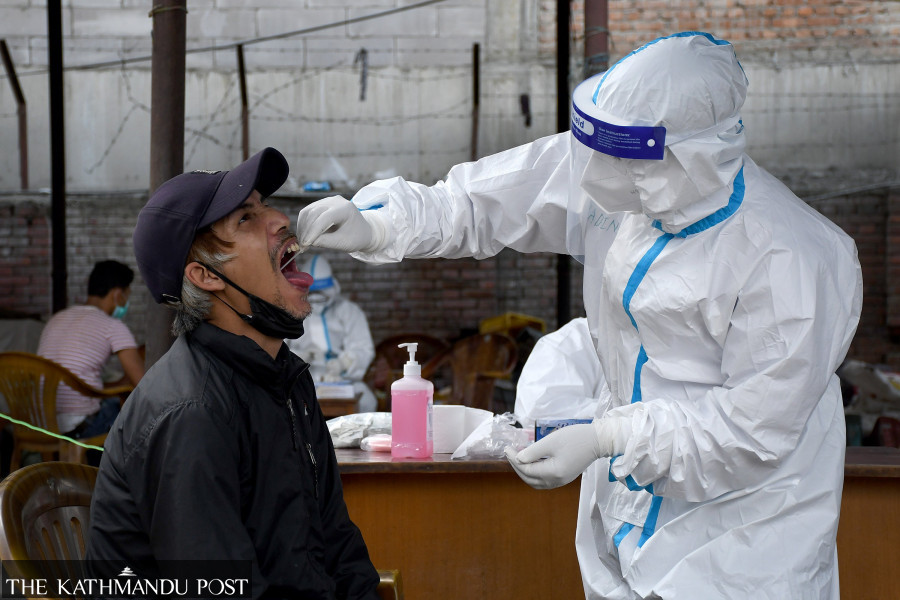Valley
Kathmandu planned 10,000 antigen tests daily, did 7,306 in two months
The biggest metropolis in the country with over 1.6 million population has twice become Covid-19 hotspot—last year and this year.
Anup Ojha
The Kathmandu Metropolitan City in the first week of May had planned to conduct a total of 50,000 antigen tests in five days aiming to test 10,000 people per day. However, in more than two months until last week the City has been able to carry out just 7,306 antigen tests.
The biggest metropolis in the country with over 1.6 million population has twice become Covid-19 hotspot—last year and this year. Amid poor response to antigen testing from the public, the City has stopped updating the antigen testing data since July 5.
“People didn’t show interest in the test although we visited each and every ward,” said Rishi Bhusal, coordinator of the antigen and polymerase chain reaction test of the City.
The City’s data show that of the total 7,306 antigen tests, 622 returned positive results. Those testing positive for Covid-19 included 302 men and 320 women.
The City’s Public Health Department’s data show that 51,081 PCR tests have been conducted until July 10.
“People appear to be interested only in polymerase chain reaction tests and have been avoiding antigen tests despite our repeated requests, so we have almost stopped antigen testing,” said Bhusal.
In the second week of June when the City’s Ward-32, which had been identified as a major Covid-19 hotspot, set up a camp for conducting mass antigen testing of vegetable shop owners in the Koteshwar area, the shop owners had fled home closing their shops.
An antigen test, also called a rapid diagnostic test, detects certain proteins in the coronavirus. Nasal fluid sample is obtained using a long nasal swab. These tests can produce results quickly but are less reliable than the polymerase chain reaction tests.
And public response to antigen tests is no better in other two neighbouring cities— Lalitpur Metropolitan City and Bhaktapur Municipality.
Lalitpur City’s spokesperson Raju Maharjan said the last time they conducted antigen testing was two weeks ago.
The City, which had launched a mass antigen test drive in May, has so far conducted only 5,000 antigen tests of which 251 returned positive results, according to Devi Thapa Gurung, the Covid-19 focal person at the City.
She said the City has identified high risk groups and areas where it plans to resume mass antigen testing soon.
“As the prohibitory orders have been relaxed, we plan to conduct antigen testing in factories, industrial areas and vegetable shops where transmission risk is high,” said Gurung.
Meanwhile, Bhaktapur Municipality has until Sunday carried out antigen tests on 2,866 people, of which 120 tested positive.
“We have been conducting both antigen and PCR tests on people. Covid-19 cases are still coming to Khwopa Hospital. We have deployed volunteers at ward level to make people aware of the virus, its symptoms and precautions to be taken,” said Bhaktapur Mayor Sunil Prajapati.
The municipality’s data show that 3,998 people have been infected with the virus with the number of fatalities reaching 73 to date. The data also show that the city has carried out less than 3,000 antigen tests so far as compared to 3,339 polymerase chain reaction tests.
Dr Ratna Sundar Lasiwa, health coordinator of Bhaktapur Municipality who is also the chief of Public Health Care at the municipality, said that on Sunday alone it carried 60 antigen tests of which six came back positive.
“One of the reasons for people’s reluctance to undergo antigen tests could be that there is no Covid-19 health insurance so they fear testing positive. But our municipality is working to raise awareness about the importance of testing,” said Lasiwa.
When they started the drive, all the local bodies had announced plans to carry out antigen tests on symptomatic patients and also on those who came in contact with them. But things did not go as planned due to a lack of coordination among the stakeholders, according to experts.
Dr Sher Bahadur Pun, chief at the Clinical Research Unit at Teku-based Sukraraj Tropical and Infectious Disease Hospital, says none of the local units in the Valley could perform antigen tests efficiently.
“Antigen test is one of the mediums to know the nature of transmission. As we are in the beginning of a third wave, had we been able to carry out mass antigen tests, that would have certainly helped fight the virus effectively,” said Dr Pun.
Antigen testing kits were received in donations from various countries with Switzerland alone providing 1.1million. In May last week, the Health Ministry had sent 1.7 million antigen testing kits across the country with a plan to carry out 25,000 tests daily.




 11.84°C Kathmandu
11.84°C Kathmandu.jpg)














